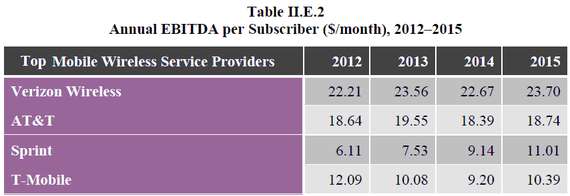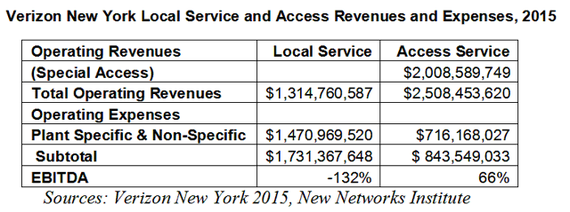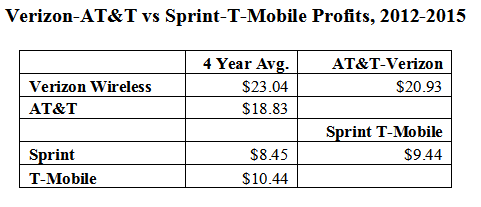I received an email from the Communications Workers of America (CWA) asking me to sign a petition to stop the FCC proposed plans pertaining to "special access" services, now called "Business Data Services" (BDS). (CWA is the largest union for telecommunications, followed by IBEW.)
The rumored FCC plan is to start by doing a partial course correction modeled on a deal between INCOMPAS, the competitor association, and Verizon, which asks for a modest reduction in the price of special access services.
As we've written, BDS are not 'special' but are the basic wires of the state utility that have been reclassified for business services, from ATM machines or alarm services or those rented by competitors for wireless traffic.
Sometimes called "backhaul", Business Data Services have had obscene profits for more than a decade. Moreover, we also think the deal is terrible. The FCC should be undertaking a full investigation of the massive cross-subsidies between and among the wireline and wireless divisions of Verizon and AT&T. (The proposed deal leaves the cross-subsidies in place.)
And yet, the union claims that the FCC's plans to lower these BDS rates will harm union jobs and lower investment. Unfortunately, the CWA and IBEW filings parrot the filings of the companies who have the inflated rates - AT&T and CenturyLink, with the help of the USTA, the telco lobbying association. (And while it claims to be about protecting rural broadband, it also goes after the competitor wireless companies, like Sprint and T-Mobile, and even Verizon Wireless (which is non-union)).
In short, their message is anti-consumer, anti-competition, harms the economy and harms jobs - union jobs.
NOTE: From interviews with CWA and IBEW, we know that both unions have seen significant job losses over the last decade. Verizon and the industry ironically calls these "surpluses" and the company publishes listings of where there are 'too many workers' and where there needs to be reductions. Verizon has been offering packages to leave and there are no new wired union members being hired for the future.
Instead, Verizon and AT&T are moving to a) shut off working retail wired services and b) force-march customers onto more expensive wireless. And Verizon will be using contractors more and more as Verizon wants to continue to keep the unionized workforce from the wireless business.
(AT&T Wireless is different on this, which is one of the reason the unions are attacking Verizon. But, AT&T Wireless, etc. is not beholden to the unions and they can also move toward using contractors.)
And rural areas? As we've written, the companies are already planning to shut off the wires that the union jobs are tied to and go wireless.
The real irony to this is - the 'surpluses' (job cuts) were created because Verizon has not properly maintained or upgraded the networks as they should have been doing. These wireless substitutions are nothing more than a bait and switch. In states like Pennsylvania or New Jersey, 100% of their state territories were supposed to be upgraded to fiber optics, including rural areas. Customers paid billions per state for fiber to the home, not inferior, expensive and much slower wireless services. The fiber build outs (and maintaining the copper until they were done) would have resulted in increases in union jobs and would have benefited not only the unions, but also the cities, the public and the economy. And most of AT&T's 21 states also had commitments that were trashed, even though state laws were changed to charge customers billions per state for upgrades they never got.
So, what makes anyone think if the FCC listens to the CWA & IBEW about these jobs, that Verizon or AT&T will use that money to expand FiOS or maintain one more union job than they have to?
And yet, CWA and IBEW filed comments at the FCC, asking the FCC to keep prices inflated. They claim:
"Dramatic cuts in BDS would lead to reduced investment in broadband networks - especially rural areas - downward pressure on jobs and living standards"
"A drastic cut in BDS rates will increase disincentives for job-creating investment and high speed networks."
AT&T et al., of course, want to keep prices inflated. The history of the last decade shows that excess special access profits didn't stop Verizon from halting its FiOS fiber to the home deployments nor did it affect the amount spent on network investment. And the telcos are going continue to cut jobs and move the services to wireless regardless of cuts in BDS pricing.
Worse, letting them keep all of the overcharging will simply give them more budget to enter the entertainment and advertising business.
But, in the end, the unions are just shooting themselves in the foot as the companies they claim to be helping are trying to eliminate the unions. As we will discuss, the obscene profits comes, in large part, from dumping the expenses into local service, which made the local networks look unprofitable, and this was then used as an excuse to not upgrade and maintain the networks--i.e., it has been used as an excuse to cut union jobs and not wire cities.
By backing the telcos, the unions either do not get or have not thought through the subplot that this is already harming them.
Many in the telecommunications unions have had a different point of view. They believe that the unions need to become advocates for the consumers and the communities. They have the working knowledge that can be used to expand the networks and that is the only way that the networks will ever get built out and maintained -which means more jobs.
As you will read, in PA, there is an active investigation about the condition of the networks, but it requires the regulators to also do their job and protect the public interest, something that has been sorely missing.
Let's go through some basic points:
1)Major Overcharging of BDS Services
First, Consumer Federation of America, CFA, found $150 billion in overcharging and economic harms over the last five years.
Consumer Federation of America writes:
"The Consumer Federation of America (CFA) today released a study that estimates that large incumbent telephone companies have engaged in abusive pricing practices for high-speed broadband "special access" services, with overcharges totaling about $75 billion over just the past five years. As a result, CFA estimates that the indirect macroeconomic loss to American consumers doubles that damage to a total in excess of $150 billion since 2010."
Our independent analysis corroborated CFA's findings, and we used different financial information. In fact, we have filed joint comments with CFA in the FCC's special access proceedings.
Keeping special access profits and prices at the current level is just giving the telcos major gifts at our expense.
2)Special Access has Excessive Profits.
3)Special Access has been able to charge local phone customers via dumping expenses into the Local Service.
This next exhibit is an excerpt taken from Verizon NY's 2015 annual report. It shows that special access revenues were over $2 billion in 2015 and "Access" services had an EBITDA - Earnings Before Interest Taxes, Depreciation and Amortization - (profit margin) of 66%. (Special Access is about 80% of the total Access services.) At the exact same time, Local Service had $1.3 billion in revenues but had an EBITDA of -132%.
However, look at the "Plant Specific & Non-Specific" line item, which are the construction and maintenance budgets. The expenses were largely put into Local Service, making it look unprofitable. At the same time, the Access services paid only ½ or what Local Service paid. Based on revenues, Access services should have paid double what Local Service paid in network costs.
In fact, Local Service are the copper wire-based phone services. The question comes up--Why is Local Service paying any network costs when the copper networks are not being maintained or upgraded? Answer: it is cross-subsidizing Verizon's other lines of business.
Thus, the inflated profits of special access not only are outrageous, but it is in large part because Verizon could manipulate the accounting to have Local Service pay a disproportionate amount of the expenses.
NOTE: While we focus on Verizon and NY, we know that this happened in every Verizon state, including the territories that were sold to Frontier. And the last available FCC data for AT&T and CenturyLink showed the same financial accounting manipulations.
4)Not True: The extra profits would be used for 'fiber optic build outs' and any cuts in access will slow deployment.
CWA claims that reducing rates will slow down the building out of the fiber networks and this would harm jobs. This is totally false.
In fact, in Pennsylvania, CWA union's press release, September 29, 2016, states that the utility networks are deteriorating.
"The CWA Filing Documents Verizon's Systemic and Continued Neglect of Telephone Infrastructure... Testimony and Photographs Expose Verizon's Failure to Repair Copper Network and Company's Policy of Forcing Customers to Use VoiceLink, Putting Those Who May Need Future Medical Monitoring at Risk."
Two things are going on. First, the 'plant specific &. non-specific' massive budgets that were placed in Local Service were never used for their supposed intended purpose - to maintain and upgrade the state, wired utility networks.
And second, with 66% EBITDA profit margin on BDS--for the last decade, CWA contradicts itself. This Pennsylvania CWA release details an investigation of the networks in PA and it clearly shows that Verizon did NOT use the excess profits to properly upgrade and maintain the wires.
And in every state, the company stopped deploying FiOS, the fiber to the home service. Cutting the profits will not 'restart' the build out.
CWA should have been calling for an investigation of the plant expenses that were diverted to Local Service and are not being used for maintaining the copper networks.
Special Access Wireless-Wireline Collusion & Competitors
CWA decided that competitors, especially T-Mobile and Sprint, are bad and the 'incumbent' phone companies, who have union responsibilities, are the good guys.
CWA's filing states:
5)Verizon and AT&T did not pay for most of the construction of the special access wires to their own affiliate wireless cell sites.
6)Verizon Wireless (and AT&T) vertically integrated the wireline and wireless lines of business, diverting billions in capex that should have been used for cities.
7)Verizon Wireless paid a fraction of what the other wireless companies pay for access. They short-changed the state utilities.
8)Sprint, et al. are paying multiples of what Verizon Wireless is paying to use the networks as well as for construction. They are being overcharged billions of dollars, nationwide.
The truth of the matter is, the incumbents are state utilities, and they are not the 'wireless companies'. But that's only part of the story.
Capital Expenditures for Wireless are Cross-Subsidized with Wireline.
Besides the overcharging of Local Service for the special access network use, the companies are also dumping the majority of the construction to build out a separate wireless network.
As the exhibit above shows, in 2010-2012, Verizon NY built 5,515 fiber optic, special access wires to the cell sites for Verizon Wireless at a cost to the incumbent utility estimated at $2.8 billion. These expenses should have been paid by investors and the wireless company, not the wireline state utility customers.
I.e., Verizon Wireless shortchanged Verizon NY billions in network capex; Verizon Wireless got a free ride. Competitors, like Sprint or T-Mobile, have to pay retail for these same services.
This happened in every Verizon state, including the territories sold to Frontier.
Verizon Wireless Pays a Fraction of Access Fees as Compared to Competitors
On top of this, because of the sweetheart deal between wireline and wireless, Verizon Wireless paid a fraction of the costs to use these networks, known as "Access" fees.
- In 2010-2012, we estimate that in just New York, Verizon underpaid, on average,249 million per year for Access fees while Sprint overpaid by72 million.
So, Verizon Wireless and the other affiliate companies underpaid Verizon New York billions of dollars, while the competitors were the ones who were paying more than Verizon for construction or for access.
Multiple Policies and Regulatory Tricks from these Cross-Subsidies
Billions in cross-subsidies from wireline to fund wireless has had multiple public policies impacts - including overcharging local phone customers and making the local phone networks look unprofitable.
9)Major Rate Increases Due to Cross-Subsidies
Because Verizon's affiliates short changed the incumbent, there have been a host of consequences including a) less revenue into Verizon NY, b) massive excess expenses that should never have been charged to Local Service, c) multiple rate increases and d) savings on taxes.
- Claiming losses, local phone rates increased by 84% from 2006-to-2015, and there were increases on all related add-on charges that went up 50-300%, like inside wire or nonpublished numbers.
The average Verizon NY customer paid over $1,000.00 per line for rate increases that should never have occurred, starting in 2006.
10) "Massive Losses" Were Created and Used to Avoid Income Taxes.
The incumbent 'good citizen' was also able to manipulate the accounting to create massive losses and not pay state and federal income taxes. With the exception of 'extraordinary' tax changes, Verizon NY lost over $2 billion annually since 2010.
11) Control over the Cost of Wireless and the Competitor Profits.
By cross-subsidizing the other lines of business to not pay market prices, while inflating the costs to Sprint and the other companies, Verizon and AT&T were able to control the price of all wireless services, including those paid by T-Mobile and Sprint. This caused them to be less profitable and it also inflates all pricing to end user customers.
The idea that the incumbent companies (those good to the 'union') are the good guys is well, disingenuous. This chart from the FCC's recent 19th Wireless report shows the market power of those who are the 'incumbent' and also offer wireless vs the competitors.

Summarizing the information below, Verizon and AT&T averaged $20.93 EBITDA per month per subscriber, while Sprint and T-Mobile only averaged $9.44, less than half the amount. And while there are many factors that determine revenues and profits in wireless, this is no coincidence. Verizon and AT&T own the wires and have cross-subsidized their wireless business. Sprint and T-Mobile, who should be paying what Verizon or AT&T wireless are paying - are ½ as profitable because they have to pay retail expenses that AT&T and Verizon have diverted to the wireline business, or are simply paying less.
So attacking the 'non-union' competitors who are paying multiples of what Verizon or AT&T are paying for using the networks, is just self serving to the union. And how does this relate to rural access charges?
The Unions Missed the Convoluted, Twisty, Subplot.
The networks were declared 'unprofitable' because the incumbent could manipulate the accounting.
Special access inflated rates are caused, in part, because Verizon could dump a large part of the expenses into the state utility to make the phone networks look 'unprofitable'.
- This was used to claim that the networks should be shut off and the copper left to deteriorate--thus cutting union jobs.
- This claim was used to not build out broadband in the cities--thus cutting union jobs.
- The inflation of special access pricing to competitors has kept all pricing for wireless service and broadband inflated--harming customers and the economic growth of the US.
- By making the networks look unprofitable, Verizon et al. were able to get unjustified rate increases--harming customers, especially low income families and rural areas.
And 'lowering rates' is NOT going to bring more wireline fiber optic broadband, especially since the companies didn't do it when they have inflated rates.
12) Get Rid of the Unions and Use Contractors
And loss of jobs? The plan is to shut off the wired networks and go wireless - and get rid of the unions. And over the next few years, instead of using union labor to do even the wires to the cell sites, the company, since it will shift to wireless - will use contractors. Lowering special access has no impact on this plan.
Francis Shammo, EVP, Verizon, stated at the Goldman Sachs Communacopia Conference, September 22, 2016--it's all about wireless and getting rid of the labor costs.
"But it's going to be a fixed broadband wireless solution.
"And if you think about the cost benefit of that, today, if you think about FiOS and what it costs me to connect a prem to FiOS. I have to lay the fiber down the street, but then I also have to then connect the home, go into the home, make sure the wiring is right, put in install the boxes, install the routers.
"If you think about 5G, you put the fiber down the road, which is what we're doing in Boston. Then all of the labor and the expense of drilling up your driveway connecting the OT to your house and all the labor involved with that, all that goes away, because now I can deliver a beam into your - into a window with a credit card size receptor on it that delivers it to a wireless router, and there's really no labor involved and there's no real hardware other than the router in the credit card. So the cost benefit of this is pretty substantial, at least, we believe it is."
Finally, keeping access fees inflated will allow the companies to buy other 'entertainment' companies like AOL or Yahoo. AT&T bought DirecTV and has a host of services, including the purchase of FullScreen, which offers licensed TV and original content.
Where are the union jobs in building their new entertainment and advertising line of business with the extra profits from special access?




